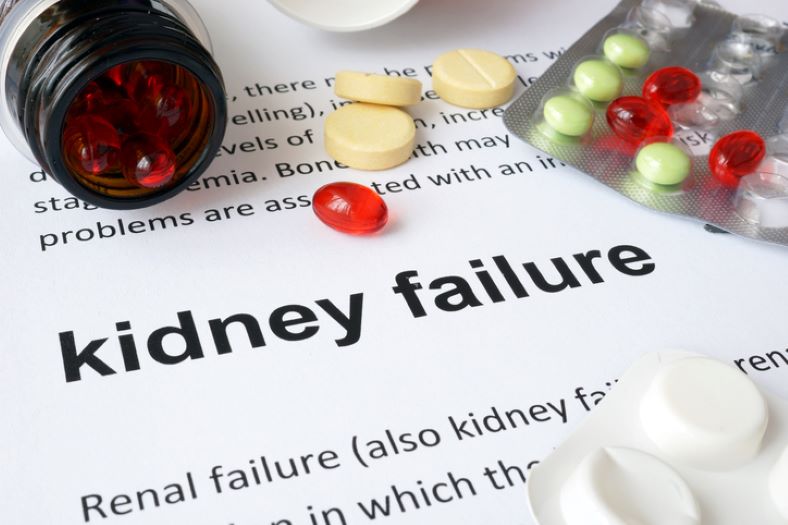Kidney Failure Lawsuits
For those who have suffered kidney failure due to defective drugs or medical malpractice, you may qualify to file a personal injury claim to seek justice. The results of kidney failure have lasting health implications that can even prove to be fatal. Victims and their families deserve compensation for their damages and suffering.
Our experienced product liability attorneys and class action lawyers share what you need to know about kidney failure lawsuits, medical malpractice, and holding the responsible party accountable.

What is kidney failure?
Kidneys are vital organs that work by removing waste and toxins that build up in the bloodstream. According to the National Kidney Foundation¹, kidney failure (renal failure) occurs when 85-90% of kidney function is gone. When the kidneys are no longer working well enough to keep a person alive without intervention, that person is considered to be in kidney failure.
What are the symptoms of kidney failure?
Some people with early kidney disease have no symptoms until the condition progresses to a much later phase. Kidney failure can show itself in the form of these common signs and symptoms:
- Poor appetite
- Trouble sleeping
- Swelling in the feet and ankles
- Anemia
- Itching
- Chronic fatigue
- Weight loss
- Muscle cramping
- Decreased urine output
- Confusion
- Nausea
- Irregular heartbeat
- Chest pain
- Seizures
Is kidney failure painful? The truth is few symptoms indicate kidney failure right away. However, you should see a medical professional if you notice any of the above signs.
What benefits can I claim for kidney failure?
For those suffering from chronic renal failure, you may qualify for Social Security Disability Insurance (SSDI) or Supplemental Security Income (SSI) disability benefits. The National Institute of Diabetes and Digestive and Kidney Diseases² shares some resources that can help kidney failure patients and their families get financial support to help cover treatment costs.
Although kidney failure can happen due to lifestyle, ongoing conditions, and other health issues, it can also occur from taking dangerous medications, medical malpractice, or physical injuries after an accident. When this happens, victims can bring a legal claim for compensation for economic and non-economic damages, including the cost of:
- Medical testing, and imaging
- Doctor consultations and visits
- Kidney transplant care
- Surgery
- Medication
- Lost wages
- Pain and suffering
What kind of injury causes kidney failure?
Some injuries can result in serious kidney damage, acute kidney injury (AKI), or renal failure. Examples of chronic kidney disease causes include:
- Abdominal pressure injuries
- Stab wounds or lacerations to the kidney
- Physical trauma from a car accident
- Any accident that reduces blood flow to the kidneys
- Severe blockage in urine flow
- Damage from a kidney infection
- Harmful medications or toxins
- Medical conditions
What are 3 examples of conditions that can cause damage to the kidneys?
There are also medical conditions that will affect the function of your kidneys, such as:
- Heart Disease – Heart disease and chronic kidney disease (CKD)³ are often linked. High blood pressure and pressure buildup in the veins can lead to damage to the kidneys.
- Obesity – Obesity can affect several functions in the body, including kidney function. The extra weight forces the kidneys to work harder⁴ and makes it more difficult for them to keep up with filtering the waste.
- Diabetes – Type 1 and type 2 diabetes can have a long-term impact on the kidneys. High blood sugar levels⁵ damage blood vessels and nephrons, leading to kidney disease.
What is the most serious complication of acute renal failure?
The most serious complication⁶ of acute kidney failure is dangerously high levels of potassium in the blood. High potassium levels can result in muscle weakness, heart rhythm issues, and even paralysis in some individuals.
How is kidney failure diagnosed?
You will need to see a healthcare professional to diagnose kidney failure or CKD. There are several methods⁷ they may use to reach a kidney failure diagnosis, such as:
- Renal ultrasound
- Body CT scan
- MRI scan
- Renal scintigraphy
- Biopsy of renal tissue
Do I have a kidney failure lawsuit?
If you have suffered kidney failure after taking a drug such as Nexium, Prilosec, Lisinopril, or Ibuprofen, you may deserve financial compensation through a lawsuit. These medications may contain harmful substances that damage the kidneys and even cause cancer. Lawsuits continue to provide monetary compensation for victims who have suffered from medical complications or death.
When a drug manufacturer is responsible for medications that are unreasonably dangerous due to design defects, manufacturing defects, or other negligent processes, you may have a legal claim for compensation. Contact an experienced medical malpractice attorney, class-action lawyer, or product liability claims law firm to see if you qualify to bring a legal claim.
Proton Pump Inhibitor (PPI) Lawsuits
Proton pump inhibitor lawsuits⁸ have been filed against many major drug manufacturing companies, including AstraZeneca, Pfizer, and Procter & Gamble, for the dangerous effects of these stomach acid-reducing drugs. Consumers suffered severe side effects after taking medication for heartburn and acid reflux, including chronic kidney disease, renal failure, and acute interstitial nephritis.
Nexium Lawsuits
Nexium contains a substance called ranitidine that, according to the U.S. Food and Drug Administration (FDA)⁹, may cause kidney cancer and damage. Although it is intended to treat gastroesophageal reflux disease (GERD), blood pressure, and smoking addiction, early batches of Nexium contained a substance called N-nitroso dimethylamine (NDMA)2, which may be harmful. Recalls for Nexium began in 2020 after testing showed dangerous levels of these substances in some samples.
Although Nexium is still available on store shelves, the chemical components have been modified to remove dangerous substances.
Prilosec Lawsuits

Prilosec kidney failure lawsuits continue to provide an avenue for individuals to claim compensation if they are hurt by taking the drug commonly called omeprazole¹º. The proton pump inhibitor medication treats conditions like heartburn and stomach acid. Doctors may be responsible for overprescribing and overuse of the medication, which should not be used for intermittent or infrequent symptoms.
A study by the Journal of the American Medical Association (JAMA)¹¹ found that individuals taking omeprazole had a 20-50% greater chance of developing a kidney issue than other individuals. As of April 2022, there are more than 13,000 Prilosec and Nexium kidney damage lawsuits still pending⁸.
Lisinopril Lawsuits
Individuals who suffer from unexpected damage after taking Lisinopril may explore bringing a claim for medical malpractice. The claim may be based on an individual taking the drug when medical care providers should have known it was not in their best interests. The doctor may not have adequately considered a patient’s medical history. In addition, they may have prescribed the wrong dosage or failed to appropriately monitor the patient while taking the drug.
Ibuprofen Lawsuits

Ibuprofen kidney failure lawsuits may allow victims to claim financial compensation. Some allege that the use of ibuprofen causes kidney failure that requires transplants and results in pain and suffering. Scientists say that long-term use of the drugs can result in preventable health problems, including kidney issues. The drug may reduce blood flow to the kidneys and exacerbate issues in those already at risk.
Even though ibuprofen is generally available over the counter, a lawsuit may still be possible for an individual who has suffered from adverse effects of using the drug. The suit may claim that drug manufacturers failed to provide adequate instructions and warnings for users.
In addition, a doctor may have improperly recommended the use of the drug without fully taking the patient’s medical history into account or providing them with adequate instruction for use and monitoring symptoms.
What Laws Apply to Kidney Failure Lawsuits?
Medical Malpractice Laws
In Colorado, a lawsuit for kidney failure is based on the standard of reasonable medical care. The case is a medical malpractice claim based on negligence. The standard is whether the treating medical professionals used the duty of care that a reasonable, ordinary person would use in the same situation.
Doctors aren’t expected to be perfect. They also aren’t expected to prevent any and all adverse outcomes. But when you have harm because of inadequate medical care, you have grounds for a lawsuit for kidney failure.
What laws apply to kidney failure lawsuits?
Medical Malpractice Laws
In Colorado, a lawsuit for kidney failure is based on the standard of reasonable medical care. The case is a medical malpractice claim based on negligence. The standard is whether the treating medical professionals used the duty of care that a reasonable, ordinary person would use in the same situation.
Doctors aren’t expected to be perfect. They also aren’t expected to prevent any and all adverse outcomes. But when you have harm because of inadequate medical care, you have grounds for a lawsuit for kidney failure.
Defective Product and Defective Drug Laws

You may have grounds for a lawsuit based on the legal theory of defective products, which includes recalled and defective drugs. You can show that the medicine you took is unreasonably dangerous. Perhaps the drug manufacturer didn’t properly test the medicine before releasing it to patients. Maybe they didn’t respond appropriately when warning signs arose from other patients.
Manufacturers also have a legal obligation to give consumers the information that they need to use their products safely. All product manufacturers have the legal obligation to sell only safe products. When they don’t, you may have grounds for a lawsuit based on a defective product.
Colorado Attorneys for Kidney Failure Lawsuits
Have you suffered from kidney failure after taking medication? Contact our experienced Colorado injury attorneys to talk about your case. Your no-obligation consultation is always free and confidential.
Sources:
¹National Kidney Foundation. What Is Kidney Failure? Retrieved 11 July 2022.
²NIDDK. (February 2020). Financial Help for Treatment of Kidney Failure. U.S. Department of Health and Human Services. Retrieved 11 July 2022.
³Kalra, P. The heart-kidney link. British Heart Foundation. Retrieved 11 July 2022.
⁴National Kidney Foundation. (24 January 2017). How Does My Weight Affect My Risk for Kidney Disease? Retrieved 11 July 2022.
⁵Centers for Disease Control and Prevention (CDC). (7 May 2021). Diabetes and Chronic Kidney Disease. Retrieved 11 July 2022.
⁶NHS. (25 February 2019). Acute kidney injury. Retrieved 11 July 2022.
⁷RadiologyInfo.org. (23 March 2021). Kidney Failure. Retrieved 11 July 2022.
⁸Turner, T. (14 June 2022). Proton Pump Inhibitor (PPI) Lawsuits. Drugwatch.com. Retrieved 11 July 2022.
⁹U.S. Food & Drug Administration. (1 April 2020). FDA Requests Removal of All Ranitidine Products (Zantac) from the Market. Retrieved 11 July 2022.
¹ºEdwards, Erika. (9 January 2020). FDA announces more recalls of antacids containing traces of carcinogen. NBC News. Retrieved 11 July 2022.
¹¹Lazarus B, Chen Y, Wilson FP, et al. (February 2016). Proton Pump Inhibitor Use and the Risk of Chronic Kidney Disease. JAMA Intern Med. Retrieved 11 July 2022.





